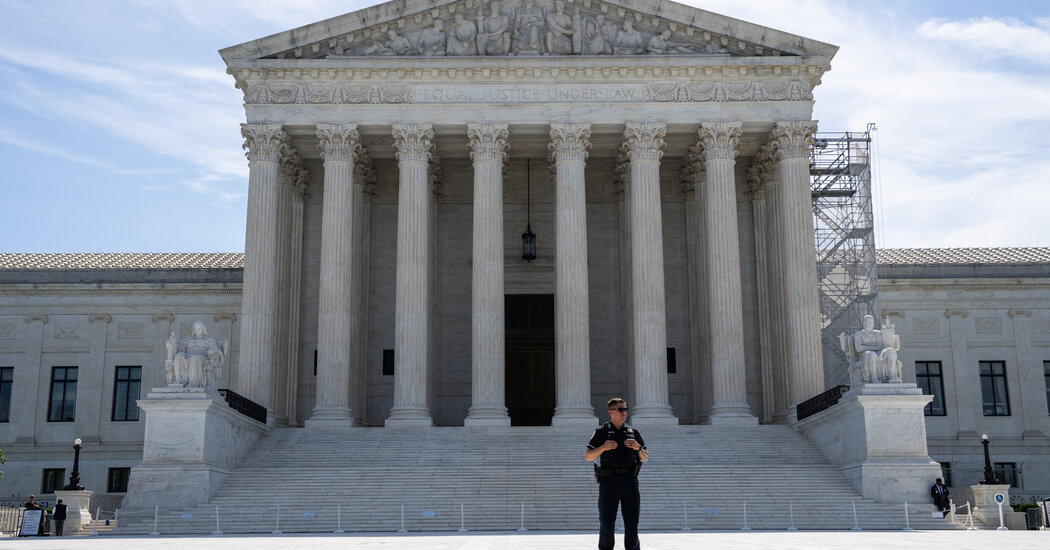A former Texas city councilwoman may pursue a lawsuit claiming that officials had abused their power by arresting her in retaliation for exercising her First Amendment rights, the Supreme Court ruled on Thursday.
The court’s five-page opinion was unsigned, which is unusual in argued cases. Justice Samuel A. Alito Jr. issued a 16-page concurring opinion, writing only for himself. Its length, structure and tone suggested that he had been assigned the majority opinion, but that it had failed to garner the required five votes.
Three other justices wrote or joined concurring opinions. Only Justice Clarence Thomas issued a dissent.
The unsigned opinion said an appeals court had taken “an overly cramped view” of the evidence required to prove a retaliatory arrest. The appeals court should have considered, the opinion said, objective evidence presented by the councilwoman, Sylvia Gonzalez, that the criminal law under which she had been charged had never been used in the county in similar circumstances.
The Supreme Court sent the case back to the lower court to evaluate that evidence.
Ms. Gonzalez, then 72, won a surprise victory in 2019 to become the first Hispanic councilwoman in Castle Hills, Texas. Her first official act was to help collect signatures for a petition calling for the city manager’s removal.
At the end of a council meeting, Ms. Gonzalez gathered the papers in front of her and put them in a binder. The petition was among them.
It was not there long. The mayor asked for it, and Ms. Gonzalez found it in her binder. As she recalled it, the mayor told her that she had “probably picked it up by mistake.”
A two-month investigation followed. At its conclusion, Ms. Gonzalez was arrested on charges that she had concealed a government document.
The district attorney soon dropped the charges, but Ms. Gonzalez, saying she had found the episode traumatic, resigned from her position. She sued, arguing that the arrest had been in retaliation for exercising her First Amendment rights.
The Supreme Court has ruled that people generally cannot sue for retaliatory arrest, whatever the arresting officer’s motive, so long as the officer had probable cause for the arrest.
But, in the court’s last encounter with the question, in Nieves v. Bartlett in 2019, Chief Justice John G. Roberts Jr.’s majority opinion recognized a narrow exception, using the example of jaywalking.
“If an individual who has been vocally complaining about police conduct is arrested for jaywalking,” he wrote, “it would seem insufficiently protective of First Amendment rights to dismiss the individual’s retaliatory arrest claim on the ground that there was undoubted probable cause for the arrest.”
How to tell when this exception applies? The plaintiff must present, the chief justice wrote, “objective evidence that he was arrested when otherwise similarly situated individuals not engaged in the same sort of protected speech had not been.”
Ms. Gonzalez, represented by the Institute for Justice, a libertarian group, said she had presented the sort of objective evidence that Chief Justice Roberts required. Her lawyers had reviewed a decade of data in her county, they wrote, and it was “clear that the tampering statute had never been used to charge someone for a common and uneventful offense of putting a piece of paper in the wrong pile.”
A divided three-judge panel of the U.S. Court of Appeals for the Fifth Circuit said that was not enough. “Gonzalez does not offer evidence of other similarly situated individuals who mishandled a government petition but were not prosecuted,” Judge Kurt D. Engelhardt wrote for the majority.
The Supreme Court said that was the wrong standard.
“Gonzalez’s survey is a permissible type of evidence,” the opinion said, “because the fact that no one has ever been arrested for engaging in a certain kind of conduct — especially when the criminal prohibition is longstanding and the conduct at issue is not novel — makes it more likely that an officer has declined to arrest someone for engaging in such conduct in the past.”
The case, Gonzalez v. Trevino, No. 22-1025, is at an early stage, and the court was required to accept Ms. Gonzalez’s account of what had happened.
Still, Justice Alito, in his concurring opinion, gave what he called a “fuller account,” relying on surveillance videos and other evidence that he said cast doubt on Ms. Gonzalez’s version of events. He said there was reason to think she had obtained signatures on the petition under false pretenses and had reason to want to hide it.
Justice Alito wrote that “courts must remember that the exception is just that — an exception, and a narrow one at that.”
Justice Brett M. Kavanaugh issued a notably halfhearted concurring opinion, saying he joined the majority opinion because it “does not seem to say anything that is harmful to the law.”
In her own concurrence, Justice Ketanji Brown Jackson, joined by Justice Sonia Sotomayor, said courts may consider all sorts of objective evidence in retaliatory-arrest cases.
In dissent, Justice Thomas said he would not allow any exceptions. “Probable cause defeats a retaliatory arrest claim,” he wrote.



